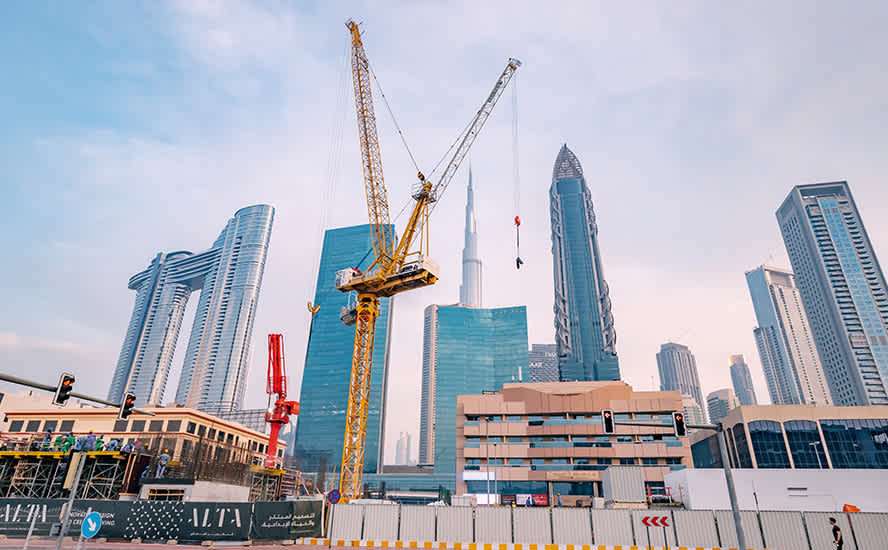Now Reading: Supply Chain and Labour Challenges UAE Drive Developers to New Strategies
-
01
Supply Chain and Labour Challenges UAE Drive Developers to New Strategies
Supply Chain and Labour Challenges UAE Drive Developers to New Strategies

Supply chain and labour challenges UAE are reshaping the real estate sector, pushing developers to adopt innovative strategies to maintain project timelines, reduce costs, and meet growing market demand. The combination of rising material prices, global logistics disruptions, and labour shortages has forced construction companies and property developers to rethink traditional workflows, contracts, and resource management methods. In this context, Dubai and Abu Dhabi are leading the way by piloting new approaches to ensure resilience and efficiency in real estate development.
Understanding Supply Chain and Labour Challenges in the UAE
The UAE’s real estate sector has grown rapidly over the last decade, driven by foreign investment, mega projects, and population growth. However, the rapid expansion has revealed vulnerabilities in the supply chain and workforce availability. Key issues include:
- Material Shortages: Delays in importing construction materials due to global logistics disruptions.
- Rising Costs: Price increases for steel, cement, glass, and other essential materials.
- Labour Shortages: Reduced availability of skilled labour due to stricter visa regulations and migration trends.
- Project Delays: Longer procurement cycles and workforce gaps are affecting timelines.
These challenges are not unique to the UAE but are intensified due to the country’s reliance on imported construction materials and migrant labour.
How Developers Are Responding
Developers are adopting multiple strategies to overcome these supply chain and labour challenges:
1. Establishing In-House Construction Teams
Major developers such as Emaar, DAMAC, and Sobha Realty are increasingly bringing construction capabilities in-house. This approach allows:
- Better Quality Control: Developers can oversee every stage of construction directly.
- Faster Decision-Making: Eliminates dependency on external contractors for adjustments.
- Cost Savings: Reduces outsourcing expenses and mitigates price fluctuations.
2. Diversifying Suppliers and Sourcing Locally
To minimize delays, developers are:
- Building relationships with multiple suppliers to reduce reliance on a single source.
- Sourcing materials locally whenever possible to avoid import disruptions.
- Investing in inventory management systems to anticipate shortages and adjust orders proactively.
3. Embracing Technology and Automation
Digital solutions are being leveraged to tackle labour gaps and inefficiencies:
- Project Management Software: Helps track progress, allocate resources, and forecast needs.
- Construction Automation: Robotics and modular construction methods reduce dependency on large labour teams.
- AI-Based Procurement: Predicts material requirements and optimizes purchasing schedules.
4. Flexible Contracting and Workforce Solutions
Developers are increasingly:
- Offering short-term contracts to attract specialised skills.
- Collaborating with recruitment agencies for skilled labour.
- Providing training programs for local workforce integration, reducing dependency on expatriates.
Impact on Project Timelines and Costs

By adopting new strategies, developers aim to mitigate the impact of supply chain and labour challenges UAE faces. Benefits include:
- Reduced Delays: In-house teams and diversified suppliers help maintain timelines.
- Cost Management: Bulk ordering and local sourcing stabilize expenses.
- Enhanced Quality: Direct oversight improves the overall standard of construction.
- Investor Confidence: Predictable project delivery keeps investors and buyers satisfied.
Case Studies in the UAE
Emaar Properties
Emaar has successfully implemented in-house construction teams for residential and commercial projects. The company reported improved delivery times and reduced dependency on external contractors.
DAMAC Properties
DAMAC has embraced automation and modular construction techniques for some of its luxury projects. This approach reduced the need for large on-site teams and lowered material wastage.
Sobha Realty
Sobha Realty diversified its supplier network across the GCC to mitigate import delays. This strategy ensured uninterrupted supply for critical projects in Dubai and Abu Dhabi.
Broader Implications for the UAE Real Estate Market
The proactive measures adopted by developers in response to supply chain and labour challenges UAE face are reshaping the market:
- Increased Resilience: Projects are less affected by external shocks, such as global logistics issues or labour migration trends.
- Enhanced Competitiveness: Developers that adapt quickly gain a strategic advantage in the market.
- Sustainability Push: Local sourcing and automation reduce carbon footprints, aligning with Dubai’s Clean Energy Strategy 2050.
- Market Stability: Predictable project delivery and controlled costs help maintain property market confidence.
Future Outlook
Looking ahead, developers in the UAE will likely continue refining their strategies to deal with supply chain and labour pressures. Expected trends include:
- Greater Investment in Technology: AI, IoT, and robotics will become integral to construction and supply management.
- Sustainable Material Adoption: Increased use of green, locally sourced, or prefabricated materials.
- Enhanced Workforce Training: Upskilling local labour will reduce reliance on expatriate workers and improve project resilience.
- Collaborative Urban Planning: Developers, government authorities, and suppliers may collaborate more closely to ensure streamlined urban growth.
Conclusion
Supply chain and labour challenges UAE developers face have prompted a strategic transformation in the construction and real estate sector. By bringing construction in-house, diversifying suppliers, leveraging technology, and adopting flexible workforce solutions, developers are better equipped to deliver projects on time, manage costs, and maintain quality standards.
As Dubai and Abu Dhabi continue to expand their urban landscapes with ambitious projects, these adaptive strategies will be essential to sustain growth, attract investors, and maintain the UAE’s position as a global real estate hub.
The future of UAE real estate will be defined not just by new developments but by the resilience, innovation, and adaptability of developers in navigating supply chain and labour challenges.
Follow us on: Instagram
Read More-UAE Real Estate Regulations Target Money Laundering






















